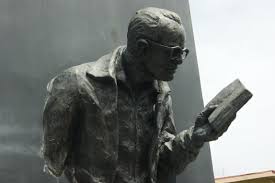
Jorge Debravo is a Costa Rican poet considered one of the most widely read and revered figure in national poetry, not only for the simplicity of his verse, but also for the intense humanism of the content. His poetry was used in the music of musician José Capmany, who also died in a car accident.
The day of Jorge Debravo’s birth, was decreed in Costa Rica as National Poetry Day. The content of his poetry ranges from the exaltation of sexual love to his very own obsession with love. and justice for others.
Biographical synthesis of the “Benemerito (With great merit) of Costa Rican Poetry”.
He was born in Guayabo, Turrialba, Costa Rica, on January 31, 1938, with the name of Jorge Delio Bravo Brenes. His parents were Joaquín Bravo Ramírez and Cristina Brenes, poor peasants.
In Guayabo there was no school and he had to go to the closest one, in Santa Cruz, which was four hours away. At the Santa Cruz school, the teacher, Doña Teresa de Albán, got him a scholarship from the board of education to go to finish primary school in Turrialba. At the age of 14 he entered fifth grade; he was in it for a month so they moved him up to sixth grade. He completed his secondary education at the Clodomiro Picado Institute.
Career path.
Economic circumstances forced him to drop out of school and look for work at the Costa Rican Social Security Fund (C.C.S.S.), at the age of 17. It is during this period that he begins to publish in the newspaper El Turrialbeño in the company of several young people from his native land (including Laureano Albán and Marco Aguilar).
The following year he spent it in Heredia, always with the Costa Rican Social Security Fund (C.C.S.S.). His job allowed him to get up close and personal with many miseries afflicting the most vulnerable population.
In Naranjo, a well-known politician had been benefitingfrom the toil of more than 200 workers, but refused to pay them insurance. Out of fear of being fired they did not want to tell the poet his name. He managed to gain the trust of one, who gave him the name. And so he managed after the appropiate handling of the case to secure insurance for them all.
It is for situations like this and a rough childhood that his poetry is steeped in so much humanism, in that love of neighbor that makes it the Supreme Law to continue, to end hunger and misery.
TIt is for this and for the works that he suffered as a child that his poetry is steeped in so much humanism, in that love of neighbor that makes it the supreme Law to continue, to end hunger and misery.hat year his merits as a worker allowed him to ascend to the position of inspector of the CCSS, this position required that he move with his family to San Isidro de El General, first, later he was transferred to the Central Valley (Heredia and San José), where he founded the Circle of Costa Rican Poets.
Debravo’s literary activities came to refresh Costa Rican literature, giving way to what some call the Period of Literary Vanguard. In 1965, he finally finished his high school studies. He studied journalism by mail and other studies in a self-taught way. He constantly read his favorite books from authors like Pablo Neruda, César Vallejo, Amado Nervo, Miguel Hernández, Bécquer and Walt Whitman.
There is a school in Hatillo 8 (in San José, Costa Rica) that bears the name Centro Educativo Jorge Debravo. There is also an educational institute in Turrialba with his name: Jorge Debravo Educational Center.
Married life.
He was 21 years old (1959) when he married Margarita Salazar and in 1960 they had a little daughter, Lucrecia, and the following year Raimundo. That same year he founded the Círculo de Poetas Turrialbeños.
Death. He died on August 4, 1967 when he had just enrolled at the University. He had just bought a motorcycle to get around due to his work and a drunk driver ran over him, thus ending the life of this great Costa Rican poet.

